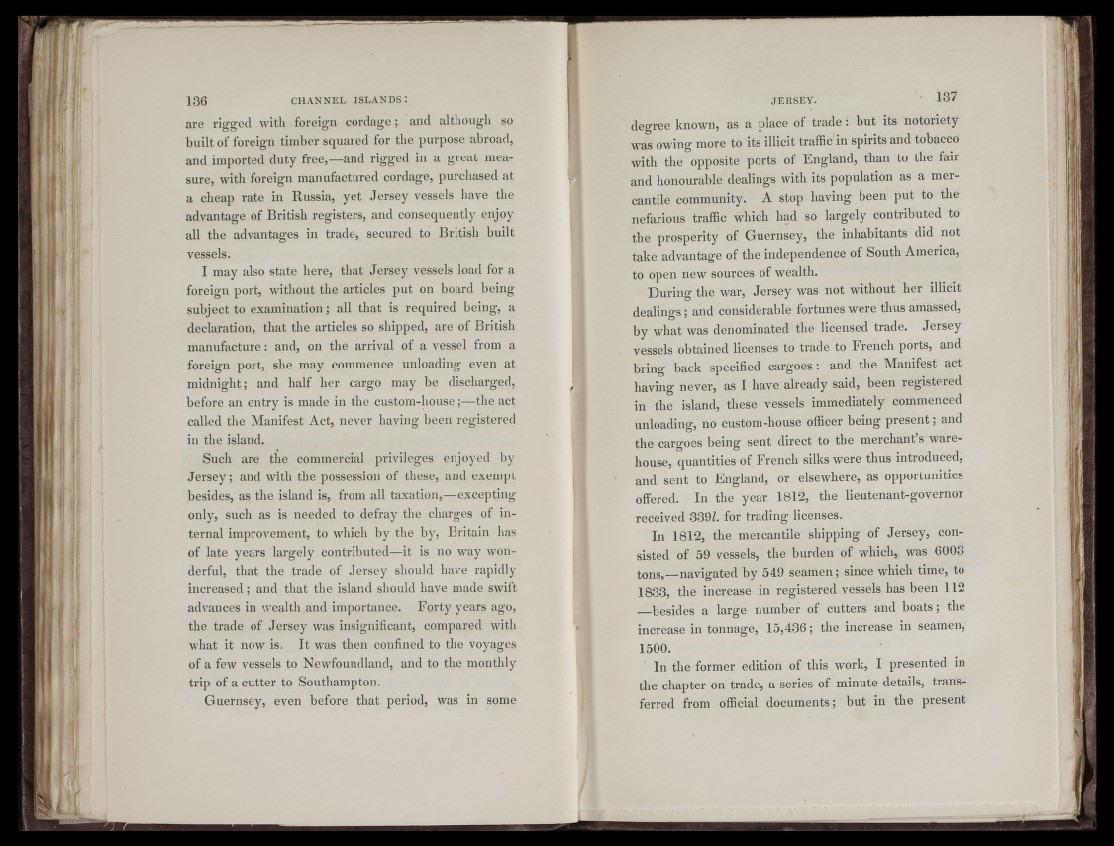
.
I i'i '
' r
ji
l ! fL i '
■I Si
are rigged with foreign cordage; and although so
built of foreign timber squared for the purpose abroad,
and imported duty free,—and rigged in a great measure,
with foreign manufactured cordage, purchased at
a cheap rate in Russia, yet Jersey vessels have the
advantage of British registers, and consequently enjoy
all the advantages in trade, secured to British built
vessels.
I may also state here, that Jersey vessels load for a
foreign port, without the articles put on board being
subject to examination; all that is required being, a
declaration, that the articles so shipped, are of British
manufacture: and, on the arrival of a vessel from a
foreign port, she may commence unloading even at
midnight; and half her cargo may be discharged,
before an entry is made in the custom-house;—the act
called the Manifest Act, never having been registered
ill the island.
Such are the commercial privileges enjoyed by
Jersey; and with the possession of these, and exempt
besides, as the island is, from all taxation,—excepting
only, such as is needed to defray the charges of internal
improvement, to which by the by, Britain has
of late years largely contributed—it is no way wonderful,
that the trade of Jersey should have rapidly
increased; and that the island should have made swift
advances in wealth and importance. Forty years ago,
the trade of Jersey was insignificant, compared with
what it now is. It was then confined to the voyages
of a few vessels to Newfoundland, and to the monthly
trip of a cutter to Southampton.
Guernsey, even before that period, was in some
Ii
degree known, as a place of trade: but its notoriety
was owing more to its illicit traffic in spirits and tobacco
with the opposite ports of England, than to the fail
and honourable dealings with its population as a mercantile
community. A stop having been put to the
nefarious traffic which had so largely contributed to
the prosperity of Guernsey, the inhabitants did not
take advantage of the independence of South America,
to open new sources of wealth.
During the war, Jersey was not without her illicit
dealings; and considerable fortunes were thus amassed,
by what was denominated the licensed trade. Jersey
vessels obtained licenses to trade to French ports, and
bring back specified cargoes: and the Manifest act
having never, as I have already said, been registered
in the island, these vessels immediately commenced
unloading, no custom-house officer being present; and
the cargoes being sent direct to the merchant s warehouse,
quantities of French silks were thus introduced,
and sent to England, or elsewhere, as opportunities
offered. In the year 1812, the lieutenant-governor
received 339/. for trading licenses.
In 1812, the mercantile shipping of Jersey, consisted
of 59 vessels, the burden of which, was 6003
tons,—navigated by 549 seamen; since which time, to
1833, the increase in registered vessels has been 112
besides a large number of cutters and boats; the
increase in tonnage, 15,436; the increase in seamen,
1500.
In the former edition of this work, I presented in
the chapter on trade, a series of minute details, transferred
from official documents; but in the present
ID